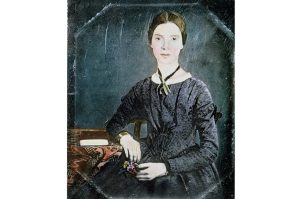Every few years I’ve picked up one or other of Anthony Powell’s A Dance to the Music of Time series and laid it aside after a few pages. Too wordy. Earlier this year I glanced again at A Question of Upbringing, the first of the 12 novels. A light came on and I was captured — providing yet another example of a novel repelling or attracting according to age, circumstances or mood. After that I tittered my way through the series, wondering at my previous humorlessness. I had one volume to go when I went into hospital last week for a minor operation, Hearing Secret Harmonies (1975), which I packed with my pajamas.
I received my discharge papers on a Friday afternoon. I got dressed and said farewell to the old man with whom I’d shared the room, who looked astonished, as though unaware of my presence until that moment. But before heading home, I had one last hospital appointment, a scan, scheduled at another Marseille hospital, situated a 10-minute walk from the first. The scan was a ‘positron emission tomography’ or PET scan, involving a prior radioactive liquid infusion into my bloodstream, which would reveal, more or less incontrovertibly, or so everybody hoped, the newly extended frontiers of my colonizing disease.
The route between the two hospitals took me along a Marseille street filled with unmoving rush-hour traffic. Covering every inch of the branches of a mature pavement tree, a great flock of starlings was resting momentarily from its murmurations. Their clamor drowned out even the parping traffic. Beneath the tree, a socially distanced line of Christmas shoppers anxious for admission to Lidl appeared to find the phenomenon unremarkable.
The second hospital was bigger than the first. I located the department of nuclear medicine, finally, at the end of a corridor along which the curvature of the Earth was visible. It was now after three o’clock and I had the sense of arriving among the disoriented remnants of an emergency evacuation. The few people I saw were either leaving or making frantic preparations to leave. The nuclear medicine receptionist was struggling for an armhole in her faux-fur coat. Aghast, she checked her list and found a name matching mine. A patently pissed-off nurse was delegated to lead me away to an examination room.
First the radioactive liquid. After three sharp mistakes, she inserted a cannula into a vein and connected me via a long tube to a bag of liquid suspended from a small mobile gallows. ‘Don’t move,’ she said. Then she legged it, perhaps to resume cramming sensitive documents into a makeshift incinerator. With my free arm I extracted Hearing Secret Harmonies from my rucksack, found my place, and was instantly transported to a dinner table conversation at a literary luncheon in about 1969. The pervert-spy-bore-dropout Lord Widmerpool had entered the room. Joy.
Forty minutes later the nurse returned, disconnected the cannula and led me along another corridor to a door plastered with signs warning of radioactivity beyond.
We went in. She told me to drop my trousers and lie on a tray and I was fed into the tube of what looked like the suspended animation module of an intergalactic spaceship. ‘Don’t move,’ she said. I lay in the humming tube for 20 minutes and was shot out again. She directed me to a seat in the corridor outside, where I whipped out Hearing Secret Harmonies again and was back at another witty dinner table, this one at the Royal Academy. Lord Widmerpool was calling the room to order prior to another of his increasingly mad speeches.
[special_offer]
He was interrupted by a woman doctor striding towards my seat in the corridor. In her hand she held my future, handily condensed into a single image of my insides. She was waving it at me in a rather threatening manner. She also looked aghast. I understood that the image would be studied later by an expert and the conclusions drawn would be conveyed to me by an oncologist at a later date in a professional manner. Nevertheless this woman taxed me with a lot of urgent questions about the history of my innards; questions that could only have arisen because the image in her hand was not very dissimilar to an X-ray of one of those enormous honeycombs I was permitted by my parents as a treat on Southend pier on Sunday afternoons in the 1960s.
Ominously, she was particularly interested in my colon, kidneys and left ribs. It was quite possible, however, that the urgency of her questioning was due to a promised place in the last helicopter leaving from the roof in about five minutes.
‘Now you can go,’ she said before hurrying off. I reopened Hearing Secret Harmonies and returned to Widmerpool’s speech and read on, in the empty corridor, in the deserted hospital, until the end of the chapter.
This article was originally published in The Spectator’s UK magazine. Subscribe to the US edition here.


















